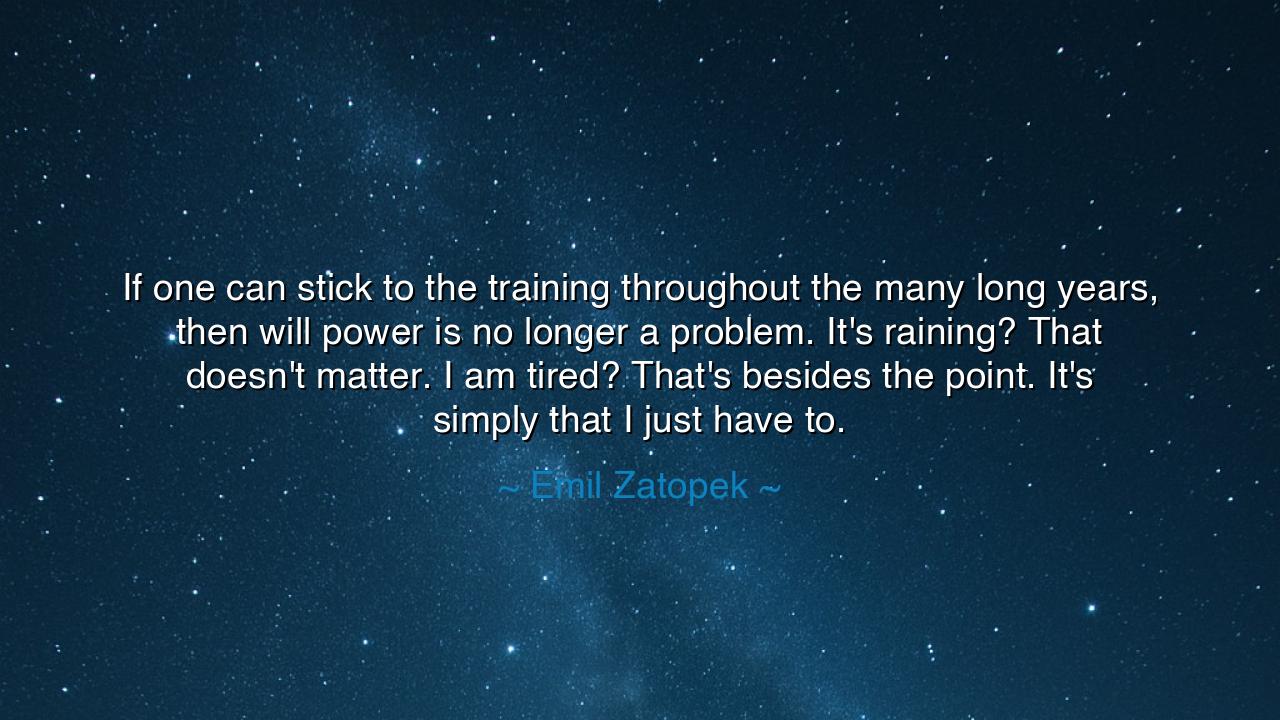
If one can stick to the training throughout the many long years
If one can stick to the training throughout the many long years, then will power is no longer a problem. It's raining? That doesn't matter. I am tired? That's besides the point. It's simply that I just have to.






The words of Emil Zatopek burn with the fire of endurance: “If one can stick to the training throughout the many long years, then will power is no longer a problem. It’s raining? That doesn’t matter. I am tired? That’s beside the point. It’s simply that I just have to.” In this declaration lies the essence of discipline—not a fleeting burst of effort, but a steady flame that no storm can quench. For when habit becomes nature, struggle turns to strength, and what once required force of will becomes as natural as breath.
To endure long years of training is to walk the ancient road of mastery. The body may rebel, the mind may falter, and the world may place obstacles in the path. Yet Zatopek teaches that beyond the threshold of resistance lies freedom: when the question of “should I?” dissolves into the certainty of “I must.” Here the discipline itself becomes the master, and the runner no longer fights with himself, but flows in harmony with his task.
History remembers Zatopek not only as a champion but as a legend. At the 1952 Helsinki Olympics, he achieved the impossible: winning gold in the 5,000 meters, the 10,000 meters, and the marathon—all within a single Games, the marathon being the first he had ever run. Such a feat was not born of luck nor fleeting inspiration, but of years of relentless training, when fatigue, weather, and doubt were set aside as trifles. His victories were the harvest of a will that had long since been forged into instinct.
This truth stretches beyond the track. Warriors of Sparta, artists of Florence, monks of distant temples—all knew that greatness is not seized in a moment but cultivated daily, until discipline becomes the marrow of the bones. The rain, the weariness, the excuses—these are nothing before the one who has trained his spirit to rise regardless. In this way, will power ceases to be a battle and becomes the natural song of a steadfast life.
Therefore, let this wisdom be passed on: greatness is not in talent alone, but in the refusal to yield. To endure the long training is to free oneself from the chains of hesitation. As Zatopek declared with his life, the day will come when excuses no longer matter, when every obstacle is but air before the runner’s stride. And then, the soul will know true mastery—the victory not only of races, but of the self.






HUHoang Uyen
This perspective fascinates me because it reframes willpower as a byproduct, not a requirement. Zatopek’s philosophy feels like meditation in motion—the act becomes automatic, beyond emotion or circumstance. But I’m curious whether this mindset applies outside athletics. Could artists, writers, or professionals benefit from treating their work with the same inevitability? Or would that approach strip away the joy that fuels creativity?
HHLe Hung Huy
Zatopek’s words remind me that true strength lies in consistency, not bursts of effort. When something becomes part of who you are, external conditions—like weather or fatigue—lose their power over you. Still, I wonder how one builds that level of mental resilience. Is it born out of passion, or does passion fade and habit take over? Maybe both are needed to endure the ‘many long years.’
TNThang Nguyen
I find this statement incredibly inspiring yet slightly intimidating. It’s the kind of mindset that separates the great from the average. The idea that ‘it’s simply that I just have to’ shows complete surrender to purpose. But I can’t help but ask: is this sustainable for everyone? At what point does determination turn into obsession, and how do we know when to pause without feeling weak?
TCNguyen Trieu Thao Chi
This quote really embodies the essence of discipline. Emil Zatopek seems to suggest that true mastery isn’t about motivation, but about habit—the kind that overrides excuses. It’s a powerful idea: that once discipline is ingrained, willpower becomes irrelevant. But it makes me wonder—does such relentless focus come at a cost? Can the same mindset that builds champions also make people blind to balance and rest?